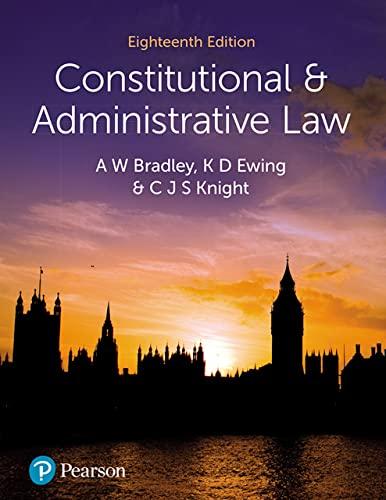Question
Module 2, Criminology in the World : (Criminal Law in Canada) For the Criminology in the World discussion forum, find something to examine for evidence
Module 2, Criminology in the World: (Criminal Law in Canada)
For the "Criminology in the World" discussion forum, find something to examine for evidence of criminological concepts and principles at work. You need to find something in the real world that is connected to Module 2: this could be a local event, your own and others' behavior, or some sort of social 'artifact' (e.g. movies, TV shows, books, songs, newspaper articles, blogs, current events.). Of note, Canadian examples are more appropriate for this discussion post as it relates to Canadian Law.
For your post, (a) describe the thing you have chosen in enough detail so that the rest of us understand it, and then (b) make clear connections to Module 2.
- Post your thoughts on the above issues.
- Respond to below discussion
a) The case I have chosen to examine for criminological concepts is a breakthrough in a historical homicide case. A sixteen-year-old Metis girl, Pauline Brazeau, was last seen leaving a restaurant in Calgary in 1976. Her body was later discovered on a back road, where an autopsy determined her death to be homicide; however, the case has been cold for the past 47 years. In 2021, Alberta RCMP revisited this case and was finally, after almost 50 years, able to test the genetic DNA collected from Brazeau's body. From the RCMP findings, they were able to single out and charge 73-year-old Albertan Ronald James Edwards with Brazeau's murder in 2023, and he will be appearing in court later this year on account of these charges.
b)I find the technological advances in genetic DNA testing that aid in solving cold cases extremely interesting. Genetic DNA evidence can be a useful element in helping to establish actus reus and mens rea during a case. It can support actus reus by placing a suspect at the crime scene if their DNA were, for example, found on a weapon collected. It can also link a suspect to a specific action, such as in a case of sexual assault. In the case of mens rea, DNA evidence on a weapon may suggest that the suspect knew what the weapon was or had thoughts of a specific aim for using it. In a case of sexual assault, DNA evidence could support establishing whether the act was consensual or not. I am aware, however, that no DNA evidence on its own could be enough to justify actus reus or mens rea, but it does contribute to building a complete picture of the crime that has occurred.
i want a discussion for module 2
and a reply for discussion a, and b
Step by Step Solution
There are 3 Steps involved in it
Step: 1

Get Instant Access to Expert-Tailored Solutions
See step-by-step solutions with expert insights and AI powered tools for academic success
Step: 2

Step: 3

Ace Your Homework with AI
Get the answers you need in no time with our AI-driven, step-by-step assistance
Get Started


